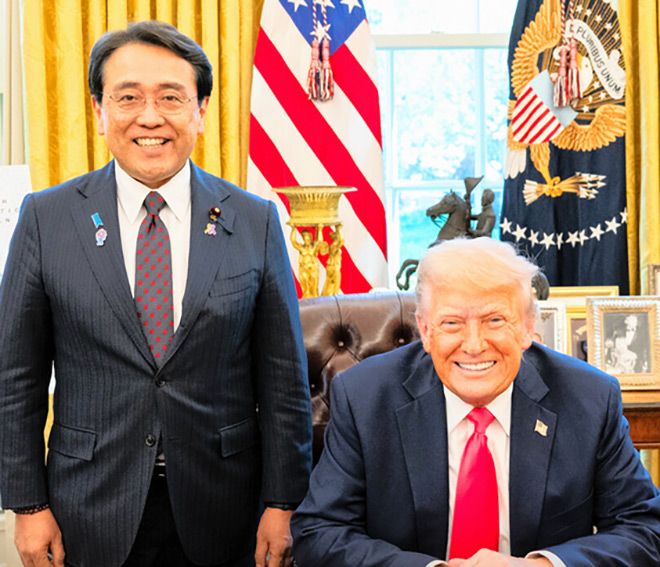Japan was first up among nations around the world in negotiations with the United States over high tariffs unilaterally announced by U.S. President Donald Trump.
Shortly before talks were to be held in Washington between Ryosei Akazawa, minister of economic revitalization who is serving as point man for Japan in the negotiations, and U.S. Cabinet ministers in charge of the issue, Trump himself announced that he would also be sitting in on the discussions.
The talks began in a highly unorthodox manner, with the inclusion of national security issues, which are not directly related to tariffs, on the negotiation agenda.
Japan largely depends on the United States in both the economic and national security sectors, and the course of the negotiations will be deeply connected to stability in the lives of the general population.
But unlike trade negotiations of the past that sought out compromise points within the economic sector, this round of talks will likely unfold in a different dimension.
The government as a whole must seek out a comprehensive strategy to break through the current situation while taking into consideration all possible scenarios.
Prime Minister Shigeru Ishiba will be called upon to demonstrate leadership in coming up with that strategy by bringing together the relevant ministries.
Prior to the start of the talks, Trump indicated that he would bring up expenditures for military support, in addition to tariffs and trade.
According to several government sources, in his meeting with Akazawa, Trump touched upon the shouldering of expenses for stationing the U.S. military in Japan.
Trump repeated his past arguments that the Japan-U.S. Security Treaty was unfair because only the United States was obligated to come to the defense of Japan.
After the meeting, Trump posted on social media that “big progress” had been made.
Japan must respond to the unusual methods being employed by the United States. Ishiba said that the discussions allowed for future talks and indicated his intention to visit the United States.
What must be kept in mind regarding future negotiations is to question as much as possible the distorted policies and understanding of the Trump administration.
This will be important not only for the benefit of Japan, but because it will also serve as a precedent for other nations that must negotiate with the United States.
The U.S. tariff measure is self-centered, lacks rationale and is an outrageous act that threatens the global economy.
There is a need for Japan to continue pointing out the problems with that measure as well as present its stance of protecting a free and fair trading order.
Japan must calmly respond to the dissatisfaction at the small number of U.S. autos sold in Japan.
In the national security sector, Trump is also mistaken in his understanding of expenditures for stationing U.S. troops in Japan.
He said that while the United States has paid hundreds of billions of dollars to protect Japan, Tokyo has paid nothing.
But Japan has, in fact, shouldered a large amount of those expenditures.
In addition, bases have been provided to the U.S. military in various parts of Japan.
The Japan-U.S. alliance has benefited the United States for its global strategy and by bringing peace and stability to the Indo-Pacific region.
Local communities hosting the bases, in particular Okinawa Prefecture, are troubled by many problems, such as noise pollution, environmental contamination and crimes by U.S. military personnel.
No easy promise should be made for increasing the amounts spent on stationing U.S. troops and Japanese defense without making the effort to correct Trump’s mistaken understanding of the unfair nature of the alliance.
–The Asahi Shimbun, April 18


AloJapan.com